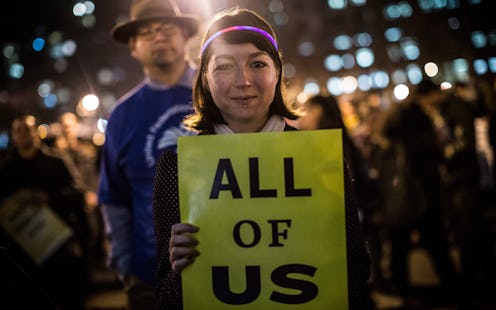
As awareness grows around how the gender pay gap impacts women, a lot of people are talking about the hiring and pay discrepancies that women face in the workplace. The wage gap is unfortunately still a very real problem — according to a study from job marketplace website Hired, men in tech industries are offered higher salaries than women nearly two-thirds of the time, which means that female employees are often at a disadvantage before you even start working for a company. But if we're going to talk about the gender pay gap, we need to talk about privilege and how it affects our discussions of what equality looks like.
When we're talking about equal treatment in the workplace, there are factors that make it more complicated than it simply being an issue about the numbers on our paychecks — it's an issue, at its core, of opportunity, and who is afforded which opportunities. It's widely known that Black and Latinx women make less than white women — but according to Hired's data, the average white woman earns more than a Black or Latinx man. Although Equal Pay Day for the average woman is usually observed in April, it varies depending on your ethnicity. In 2018, Asian women reached equal pay to white, non-hispanic men on Feb. 22, while white women receive equal pay on April 17. For Black women, equal pay won't arrive until Aug. 7. And Latinx women won't earn the same amount as the average white man did in 2017 until Nov. 1, 2018.
And when it comes to equal pay, there's a tough question we need to ask ourselves. I'm all about leaning in — Sheryl Sandberg's book is one of my favorites — but I've realized that most of my thoughts about pay inequality are about people like me — relatively privileged millennial women who work in office settings and have the privilege to protest unfair treatment. Why do our Equal Pay Day conversations so often center white-collar, educated workers, when women in blue-collar fields often have startling pay gaps? According to Business Insider, female aircraft mechanics make 56 cents for every dollar earned by their male colleagues. And female agricultural workers face troubling rates of sexual harassment and assault, which impedes their ability to work in an equitable environment, much less campaign for equal pay.
And while discussing the gender pay gap from a lens that takes into account the intersection of race is important, we're still not taking into account the many overlapping identities that impact people's experience in the workplace. A thesis paper from Skylar Davidson at the University of Massachusetts Amherst explores how our equal pay discussions often exclude nonbinary people who don't identify as female or male. Davidson found that openly identifying as nonbinary can affect an employee's chances of receiving a promotion, which leads to unequal pay. And according to Davidson's research, trans women fare even worse in the workplace. And because trans women don't have legal protection from discrimination in many states, they're four times more likely to face poverty.
For people with disabilities, a population that, according to the U.S. census, includes one in five Americans, the numbers are similarly stark — and not discussed nearly enough. The median pay for women with disabilities is only 72 percent than that of disabled men, according to an American Association of University Women report, but disabled folks only make 68 percent of what non-disabled people make.
We need to do better — that's something that a majority of people agree about. (One Pew Research Center study found that 63 percent of men and 77 percent of women think we should make workplaces more equal.) It's not exactly controversial to think that women in the U.S. should earn as much as their male counterparts, but true equality in the workplace will require more nuance than men and women being considered equals in white-collar industries. But when relatively privileged people who want to talk about equal pay, we need to think about how our privilege influences our approach to the discussion. Equal pay isn't just about men versus women, and if we limit our conversations to this binary, we'll be worse off for it. Equality is about race, class, gender identity, and other factors that impact someone's chances of getting a seat at the proverbial table to even discuss equality in the first place.